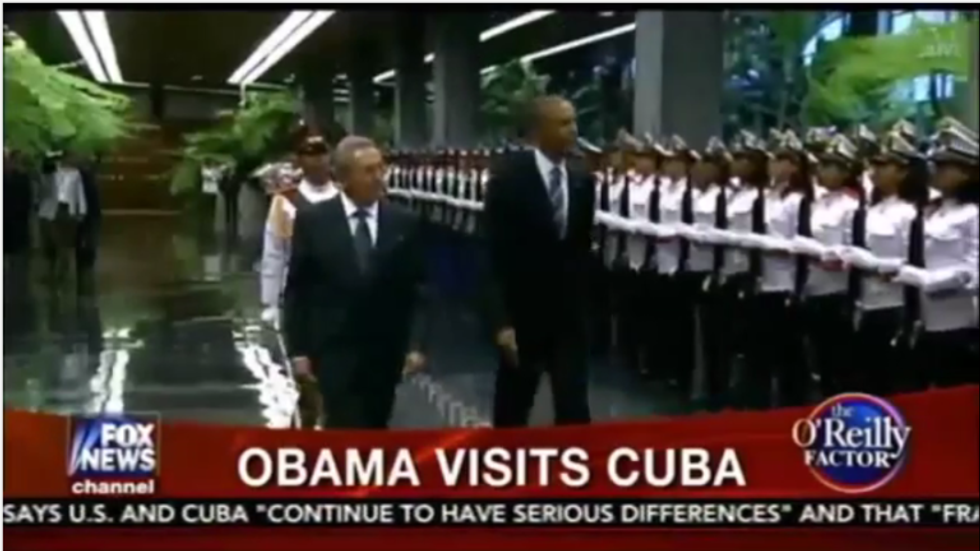US President Barack Obama landed in Havana Sunday to great fanfare, both in Cuba and stateside. His visit marks a significant shift of the United States' approach towards the socialist state, and the possibility of cooperation after decades of hostility. US media generally struck a hopeful tone, with a surprisingly nuanced mix of positive and critical stories about Cuba.
Some Cold War hold-outs in the media just weren't having it, though, taking the occasion to feign outrage that Obama could visit a country with such a terrible human rights record. While American human-rights hypocrisy is nothing new, a string of Bush-era, pro-torture, pro-Guantanamo pundits expressing indignation at Cuba's human rights failings was still remarkable.
Marc Thiessen. As a former Bush speechwriter, Thiessen helped shape the messaging around "enhanced interrogation" that provided the Orwellian phraseology the administration hid behind while torturing hundreds of detainees. He has since been a staunch defender not just of Guantanamo prison, but of force-feeding its prisoners and even expanding its use. The New York Timesrecapped his much-criticized defense of torture in 2010:
Mr. Thiessen, a practicing Roman Catholic, says that waterboarding suspected terrorists was not only useful and desirable, but permitted by the teachings of the Catholic Church.
Today, however, in the Washington Post opinion section, Thiessen suddenly discovered his inner human rights advocate, quoting an "activist" saying of Obama's trip:
This will prolong the life of the dictatorship, is worsening the human rights situation there, marginalizing the democratic opposition and compromising US national security.
Thiessen even had the gall to cite Amnesty International, which has roundly condemned the US's extrajudicial prison in Cuba that Thiessen loves to champion.
Rich Lowry. The National Review editor was another Bush-era torture advocate, telling the McLaughlin Group in 2002, when asked if the US should torture terrorism suspects:
If it comes to that, we should let someone else do it. We should send him to another country that will do the job.... Look, this is going to be a messy war and you have to do some underhanded things.
The National Review's contempt for basic human rights and legal norms continues, with the non-ironic article "Guantanamo Bay Detainees: Why Not Shoot Them?" published just last month. But Lowry has considerable concern for oppressed people in Cuba who aren't on a US military base:
Obama's Che Moment: President Obama's Cuba Visit Ignores Continued Human Rights Abuses
But a patina of revolutionary romance, embodied by that image of Che looking down on President Obama, still hangs over Cuba. It makes its human-rights abuses, theft and lies an afterthought, or even excusable, for the American Left.
Jonathan Alter. A putative liberal, Alter was one of the more vocal supporters of torture in the wake of 9/11, writing his now-infamous article in Newsweek, "Time to Think About Torture," which acts as a 1000-word trial balloon for some of the more heinous aspects of detainee abuse. He even cites the Jordanian security service threatening to kill Palestinian militant Abu Nidal's family in the 1980s as an example of torture "working."
But during the March 9 Democratic presidential debate, Alter tweeted his outrage at Bernie Sanders not condemning Cuba:
In almost 6,000 tweets, Jonathan Alter had not once tweeted out the words "human rights" until that moment. Per usual, "human rights" were not a categorical imperative, or a moral framework; they were merely a weapon to be wielded against America's enemies when our establishment pundits saw fit, and to be discarded just as quickly when they didn't.
John Bolton. Bush's UN ambassador, Bolton has long been one of the biggest advocates for keeping Guantanamo open, writing multiple op-eds after Bush left office in defense of the notorious prison. Bolton also said he was open to the idea of torture in a 2008 interview with British television. But Monday, upon Obama's arrival in Cuba, the famously unilateral Bolton appealed to the very international norms he had long dismissed (PJ Media, 3/21/16):
Bolton pointed out that the president said initially that he wouldn't go to Cuba until there were improvements in the area of human rights there. "But not only has there been no improvement, things have been going in the wrong direction," he lamented. "More people have been put in jail than have been released."
Bill O'Reilly. Leading Fox News blowhard O'Reilly has repeatedly defended torture, saying as late as 2014 that a President O'Reilly would have "authorized waterboarding and other severe interrogation methods," and calling the CIA's torture policy "morally correct." He has played the role of Guantanamo truther, insisting in 2008 that there was "no proof" of mistreatment at the Cuban detention center. But last night, discussing Obama's trip to Cuba, O'Reilly told Fox's resident straw liberal Kirsten Powers that Obama shouldn't have gone because it is a "human-rights violator."
***
Human rights are important. Human Rights(tm), as arbitrary tools of Western propaganda, are dangerous. Not only because they serve to bully unfriendly nations with cheap sloganeering, but they also, in the long run, undermine the otherwise noble and well-intentioned enterprise of establishing international norms.
"The problem with living outside the law," Truman Capote once quipped, "is that you no longer have its protection." The same is true for every Bush-era pundit who served as ideological shock troops in one of the more shameful episodes of American history. These talking heads can criticize Cuba's controlled economy, they can criticize its leadership, they can criticize its immigration policy--but they have no grounding, intellectually or morally, to criticize its human rights record.



